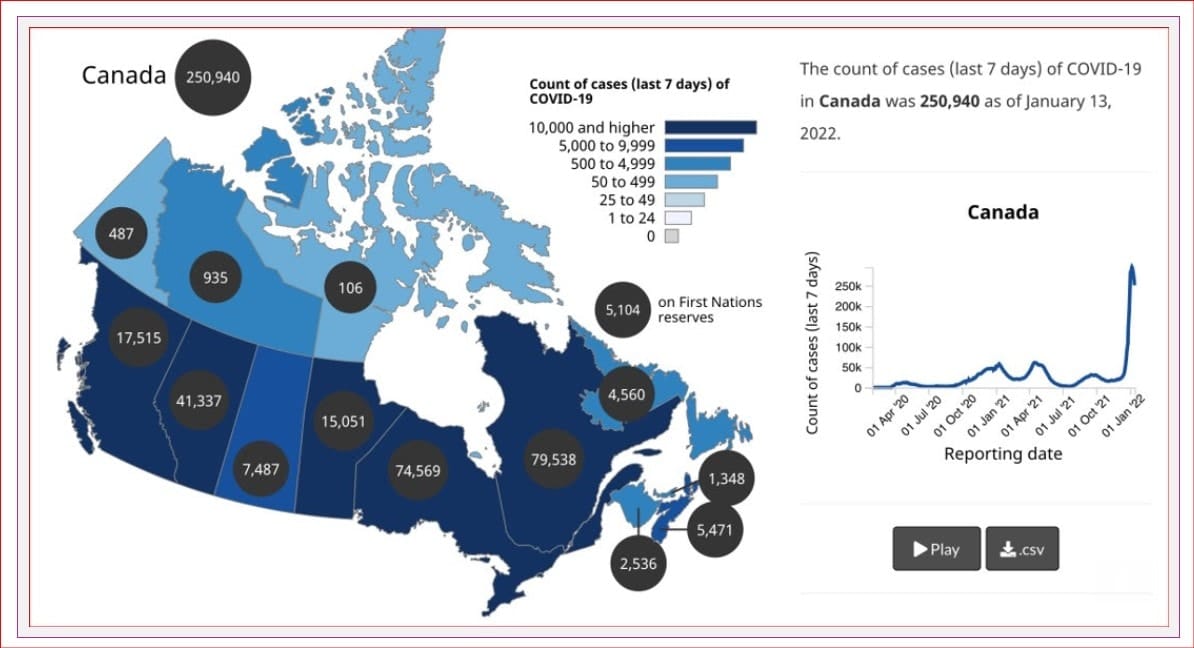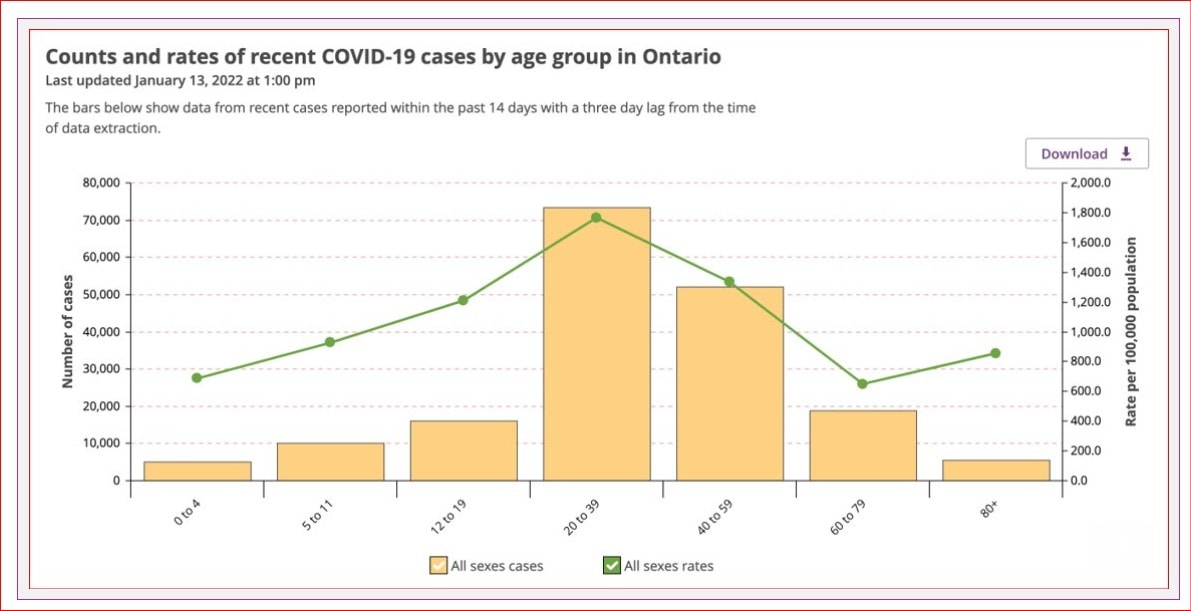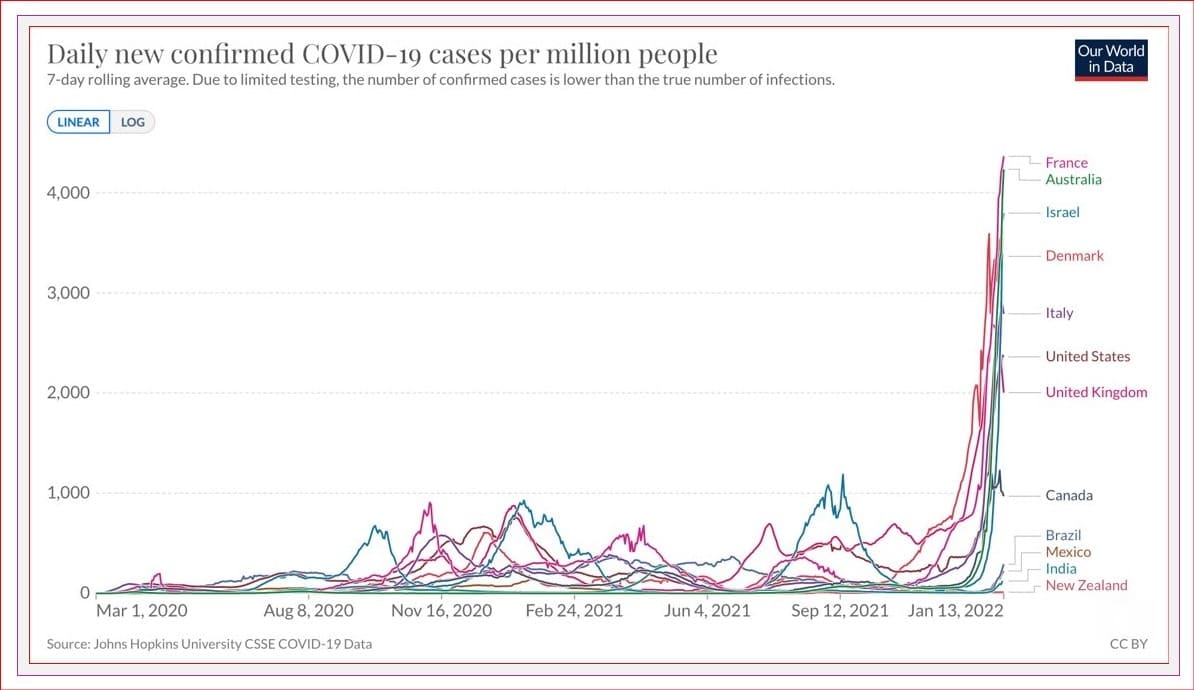Happy Monday, friends!
I hope many of your kids are back in school and the dust has settled from a long two weeks at home.
Let’s jump into the bad news, the good news, the most common questions of the week, and my silver lining.
What is the bad news?
In the last 50 days, Canada has had more documented cases of COVID than it did in the entire first year of the pandemic. And that is with minimal testing in the last few weeks. There are over 870,000 new cases confirmed since Omicron emerged at the end of November 2021. It took 400 days to exceed 870,000 cases starting in January 2020. Luckily, cases are expected to drop in the next few weeks.

Hospitalizations have risen dramatically, with over 500 people in Ontario ICUs. Hospitals are overloaded across the country and are experiencing staffing challenges due to COVID infection in healthcare workers. In British Columbia, an emergency department was forced to close completely last week because they didn’t have enough front-line workers. William Osler Urgent Care closed until February due to the same issues. In Toronto last weekend, a ‘code red’ was called, because no ambulances were available. This is very scary.

The Quebec public health director resigned amid a sharp rise in COVID-related deaths last week. A controversial financial penalty was announced for those who refuse to get vaccinated for non-medical reasons.
Cases continue to rise in the United Kingdom and the United States. Over a million new infections were reported PER DAY last week, with child hospitalizations at a record high. An average of 4.3/100,000 kids under five are admitted now (up from 2.6/100,000 last week).

Dr. Dina, what’s the good news?
87% of eligible Canadians have received the first dose of a COVID vaccine, and 82% are fully vaccinated.
60% of the population worldwide has received the first dose, and 51% are fully vaccinated. This is pretty remarkable.
Kids are heading back to the classroom today. While this is excellent news, many of you are nervous about the seemingly inevitable exposure to COVID. Schools are no longer required to collect data or report it to parents. PCR testing will only be available to kids if they develop symptoms. At the same time, families will not necessarily be alerted of COVID exposures or absenteeism unless it is > 30% of staff and students in the school. This is school board-specific. In Ontario, if teachers are absent, they may combine classrooms, leading to additional overcrowding. In Quebec, parents could be asked to supervise classrooms if no teachers are available. While vaccination should help keep kids from having severe illness, less than 50% of Ontario children have received their first COVID vaccine.
Can a booster of AstraZeneca help?
Last week AstraZeneca announced that their preliminary trial found a third dose of their vaccine increased antibodies against Omicron and other variants. They had not previously reported on booster doses of the AstraZeneca vaccine.
Is Pfizer’s antiviral pill helping?
South Korea began to use the Pfizer antiviral COVID pill to treat patients with mild or moderate symptoms last week, with a good response.
The oral medication is in the final stages of review by Health Canada. It may decrease the need for hospitalization and reduce the risk of death from COVID-19.
Could mild COVID impact you long-term?
We are just beginning to learn more about the long-term side effects of COVID infection. An article published in JAMA showed that even a mild case of COVID can result in decreased mobility and physical function in adults over 50. They looked at more than 24,000 Canadians and found a marked difference between those who had COVID and those who did not. People who had COVID had a two-fold increase in difficulty performing household activities such as going up and down stairs or getting up from a chair. 94% had a mild illness.
We still don’t know a lot about COVID and its long-term effects.
A recent study, also published in JAMA, which induced over 10,000 kids between March 2020 and June 2021 from several countries including Australia, Canada, Italy, New Zealand, Singapore, Spain, and the U.S. found that kids who are sick enough to seek care in the emergency department for COVID can experience severe outcomes (such as heart failure, stroke, septic shock, encephalitis, respiratory failure, and death). Their study found that of 3221 kids who tested positive for COVID in the ED, 3.3% had severe outcomes within 14 days. “Kids who are ill enough to be hospitalized and have COVID are more likely to have a severe outcome than kids who are ill enough to be hospitalized due to other similar types of illnesses such as RSV, influenza, and bronchiolitis.”
Should immunocompromised individuals get a booster?
Yes! Less than 40% of people identified as immunocompromised have received their third COVID-19 vaccine. Third doses are essential in ensuring adequate protection for those at increased risk of severe outcomes from COVID-19. Some immunocompromised individuals have demonstrated a sub-optimal or waning immune response due to their underlying condition.
What is the recommended COVID-19 vaccine interval for children 5-11?
NACI continues to recommend an interval of at least eight weeks between the first and second dose of the pediatric vaccine in kids 5-11 years of age. Longer intervals between the two doses result in a stronger, more robust, and longer-lasting immune response.
Optimizing the immune response in kids is important for their long-term protection against COVID as Omicron or future variants are likely to continue to circulate beyond the next several months.
The silver lining of the week
Each time the kids are back online for virtual learning, it stings a little more. Our kids and we are tired of it. They are heading back in person today, and they are SO excited. Nothing has convinced a generation of kids that they love school, their teachers, peers, and the community more than being forced to learn at home.
Our kids love learning. They love school. This is something to smile about.
Stay healthy and safe, friends.

Dina is a wife, mother of 4, and adrenaline junky. She loves to share children’s health information from her professional and personal experience. More About Dr Dina.

![[Dr. Dina News] IMPORTANT UPDATE re. VIRTUAL CARE](https://drdina.ca/wp-content/uploads/2021/01/dr-dina-kulik-kids-and-virtual-care-1a-400x250.jpg)
![[Dr. Dina News] COVID-19 Vaccine for Infants and Young Children.](https://drdina.ca/wp-content/uploads/2021/04/dr-dina-kulik-kids-and-vaccines-400x250.jpg)
![[Dr. Dina News] COVID-19 Vaccine for Infants and Young Children.](https://drdina.ca/wp-content/uploads/2022/04/DRD-1-400x250.jpg)






